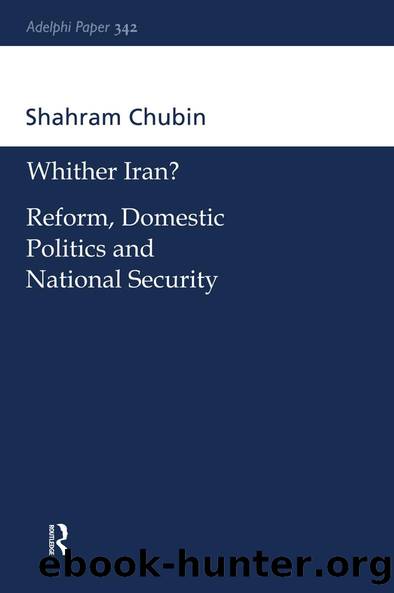Wither Iran? by Shahram Chubin

Author:Shahram Chubin [Chubin, Shahram]
Language: eng
Format: epub
Tags: History, Military, General, Strategy, Political Science, International Relations, Arms Control, Political Freedom
ISBN: 9781136049040
Google: yxKgBAAAQBAJ
Publisher: Routledge
Published: 2014-09-25T01:24:33+00:00
Politics and the Nuclear Weapons âDebateâ in Iran
In the argument that Iran is implacably opposed to WMD, public opinion is invoked by Iranians, sometimes as a constraint and at other times as a source of pressure likely to question why, given its hostile neighbourhood, Iran denies itself certain arms. But does public opinion as such exist? The politicisation of the populace and the Khatami phenomenon, together, do suggest much more than a compliant or inert mass. However priorities are domestic, focused on the bread-and-butter issues of the day. Where WMD are concerned, public debate seldom gets beyond the broadest generalities, and even expert discussion is seldom sophisticated â and this is especially true of nuclear weapons. So can we talk of a âdebate about nuclear weaponsâ? Perhaps an indirect, elite debate, which both reflects and forges a national consensus, is more accurate.
Regime politics in every domain involve creating consensus; coalitions vary according to the issues, and these cross-cutting alignments make analysing Iranian politics (and even the reform movement) an intricate and arcane exercise. Furthermore, in practice power tends to be informal as well as formal. Decisions reached can thus be the product of complex tradeoffs and agreements among groups, rather than the outcome of simple, linear, rational processes. None of this suggests that specific defence decisions are made openly.16 When Iran experienced difficulties with Russia over the agreement to refurbish the Bushire reactor, a newspaper, Salaam, ridiculed the project as a joke, and urged the authorities to break their silence and inform the public of the obstacles involved in the project.17
Certainly the opportunity costs of defence expenditures (and especially the nuclear component) have risen with the urgency of the need for domestic investment. At the same time, Khatami reflects a more consultative and accountable form of government based on transparency. These factors in combination have increased the inclination (notably by the reformist press) to demand a more open system of decision-making.
Some Iranian officials have argued that not only is forging a consensus for national security âcomplicated and time-consumingâ â involving the SNSC, Majlis, leadership, and academic and governmental experts â but that, once reached, the consensus is subject to the âcareful scrutiny of an ever demanding civil society, the press, political tendencies and groupings, universities, a growing number of NGOs and the general publicâ. To build a consensus, the authors argue, clear arguments have to be presented, and this in turn necessitates transparency and âtolerance for a diversity of viewsâ. The implication is that the hard-line view, sometimes selectively quoted by Western analysts, does not tell the whole story and represents just one of a variety of inputs into the decision-making process. For these authors, President Khatamiâs general platform of seeking détente and normalisation in foreign policy for security, and security for development, has been enthusiastically endorsed by the electorate and so is âanother determinant of Iranâs national security formationâ.18
An incident with Rahim-Safavi in 1998 is indicative. Shortly after a conciliatory CNN interview by Khatami the Guards Commanderâs remarks to a closed meeting of his officers were leaked by the press.
Download
This site does not store any files on its server. We only index and link to content provided by other sites. Please contact the content providers to delete copyright contents if any and email us, we'll remove relevant links or contents immediately.
| Africa | Americas |
| Arctic & Antarctica | Asia |
| Australia & Oceania | Europe |
| Middle East | Russia |
| United States | World |
| Ancient Civilizations | Military |
| Historical Study & Educational Resources |
Never by Ken Follett(2881)
The Man Who Died Twice by Richard Osman(2300)
Machine Learning at Scale with H2O by Gregory Keys | David Whiting(2292)
Fairy Tale by Stephen King(2070)
Will by Will Smith(2042)
Rationality by Steven Pinker(1765)
The Dawn of Everything: A New History of Humanity by David Graeber & David Wengrow(1571)
The Dark Hours by Michael Connelly(1570)
Principles for Dealing With the Changing World Order: Why Nations Succeed and Fail by Ray Dalio(1378)
Friends, Lovers, and the Big Terrible Thing by Matthew Perry(1328)
A Short History of War by Jeremy Black(1300)
HBR's 10 Must Reads 2022 by Harvard Business Review(1256)
Go Tell the Bees That I Am Gone by Diana Gabaldon(1234)
Can't Hurt Me: Master Your Mind and Defy the Odds - Clean Edition by David Goggins(1227)
515945210 by Unknown(1208)
Fear No Evil by James Patterson(1109)
443319537 by Unknown(1073)
Works by Richard Wright(1020)
Going There by Katie Couric(993)
